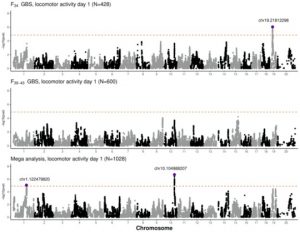Hometown: Chengdu, China
Hobbies: Baking, hiking, crafting
Lab: Palmer Lab @UCSD
Lab website: https://palmerlab.org
What do you do/study?
I study complex diseases such as psychiatric disorders and drug abuse. I conduct studies where I analyze genotype and phenotype data collected for a mouse population and locate genes that show significant contribution to the diseases of interest. In addition, I design and create mutations in mouse lines in order to study the effect of mutation on a disease.
Why is it important?
Identifying the genetic basis for complex diseases has been challenging because complex traits tend to be influenced by up to thousands of genes, each of which has a small effect on the overall phenotype. In the last two decades, because of the advancement of DNA sequencing technology, computational power improvement, and mathematical model development, geneticists are now able to use well-powered genetics study to accurately identify the genetic background that may predispose a population or a person to a certain disease phenotype. For instance, it was difficult to study the genetic basis for depression 20 years back; now we are beginning to understand the genes and biological processes that can predict risk for depression.
What piqued your interest in science?
I was intrigued by the genetics lectures taught in middle school. I wanted to know the mechanism of life.
What do you like about being a scientist?
I like that the fact that as a scientist, you have lots of intellectual stimuli, you solve plenty of problems that matter to science and human health, and you work with people that are smart and driven.
What are 5 general vocabulary terms someone should know going into your field of science?
Gene, genome, mitosis, statistics, mutation
What are 5 specific vocabulary terms someone should know about your research or profession?
Transgenic mice, linear-mixed model, population structure, polygenic, heritability
Sneak peak:
The figure shows a set of Manhattan plots for three genome-wide association studies (GWAS). It is called a Manhattan plot because the plot looks like the skyscrapers in Manhattan. Each dot is a sequenced location on the genome, and the dots are arranged in ascending chromosome order. A taller genomic position on the y-axis suggests stronger evidence for that position to be associated with the phenotype measured; here the phenotype is the distance traveled by laboratory mice in a total of 30 min after they received a saline injection.


